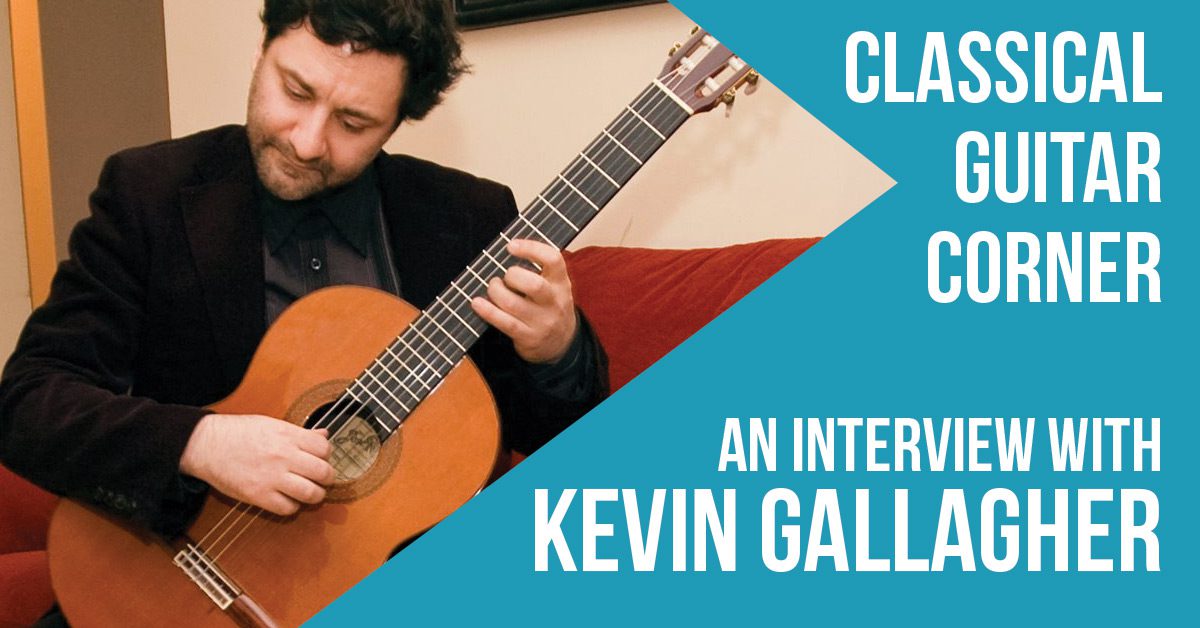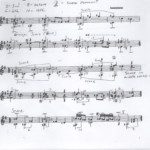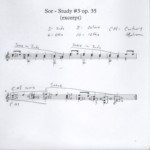Podcast: Play in new window | Download
Subscribe: Apple Podcasts | RSS
Kevin Gallagher is both an insightful educator and a excellent performer. To further this combination, Kevin is very giving with his knowledge and this discussion is no exception.
In this Episode we delve into musical analysis, intervals, scale patterns, voice movement and approaches to help you improve your understanding of music.
Kevin has provided the following downloads for you to use and follow along with the conversation. Feel free to thank Kevin for his time and efforts in the comments below! If you would like to find out more about Kevin, you can visit his site at:
Sarabande in G Major with Analysis
Sor Opus 35 #2 with Analysis
Intervals in C Major
intervals in C Major for Simon – Full Score
Intervals in G Major
gmajorintervals for simon – Full Score




HI Cant open link
Cheers
Hi Jeff,
Which link are you having trouble with, the download link? If you can’t access it here try opening it via your podcasts in iTunes if you that. If it’s something else let me know and we’ll try to get this sorted out for you as soon as possible.
Peace,
Dave B (CGC team)
Thanks Kevin for your insights.
I enjoy your analysis and the possibilities on my guitar education.
Such a great and insighting article, interview and materials…..all due to a great idea as well!!
Thanks Kevin! Thanks Simon! :-)
Fantastic . Thanks very much .
That change of mindset is great advice…..
Wonder why some teachers do not start teaching in this manner?
Thanks once again!!!
Excellent podcast! One of my favourites in that it was extremely informative and insightful. Hopefully Kevin will come back
again soon to the podcast.
An excellent pod-cast and compelling listening. The way Kevin speaks reminded me of Ben Verdery; I mean his word phrasing and enthusiasm.
A really great talk, full of information and definitely worth listening to more than once!
Wow! A light bulb went on! Thank you for this podcast which is so pertinent to me at the moment. I’ve started learning the Segovia scales and your conversation about intervals and musical analysis started to make sense . . . a little. Ha.
I so appreciate both of you and your willingness to share your knowledge.
Funny how life is isn’t it. I have been struggling with analysis, and had put it to one side as I had picked up a learned tome on the subject that left me more confused than ever, but with the distinct feeling that I had missed something. That something was listening to this podcast. Thank you Simon and Kevin . . . I just hope I can continue with the ideas and put them into practice.
So, so useful! Thank you so much!
What a great podcast! I will be listening to it again very soon. Thank you , Kevin and Simon.
A very interesting podcast that has helped me to view analysis as a skill and an aid to expression and learning rather than something to be avoided or as considered boring. Very worthwhile listening to again!
An excellent podcast Simon that has explained so much of what I have been missing. As an older beginner at classical guitar with next to no understanding of the theory of music I have been struggling when it comes to new work. This podcast has given me so much to think about and explore. Thank you for your efforts, they are much appreciated.
Thank you Kevin and Simon,
a great podcast,
people listening to the podcast of Kevin are directed into the right direction, with the latest Course about Theory Simon contributes much to open our eyes and ears to explore our musical understanding on a broader level.
thanks
joannes
The score may be complex but you’re basically playing over the changes.
I think I’m a terrible failure at analyzing. But listening especially towards the end I’m like “I see all that stuff. I recognize the motion and contra motion and patterns. And I call something like that “permutated scale” that “waterfall section”. I always thought you needed to be so facile at identifying keys and chord names and chord function as analyzing and I have never been able to do that well even with college theory. In fact I failed spectacularly a lot because I’m like couldn’t this be this or this or how do you know what a chord is called 100% when it doesn’t conform exactly (like some much more 20th century music) and not one teacher ever said “it doesn’t matter exactly what you call it as long as you can describe it”. And not one guitar teacher ever talked about fretboard theory at all at least in terms of analyzing, just placing fingers. I feel a little better that, yeah, I AM analyzing music to some degree or another. I do hazily understand the whole structure. Maybe this will help take away some mental blocks I have about “I’ll never understand music theory correctly”. Which I do realize stands in my way.